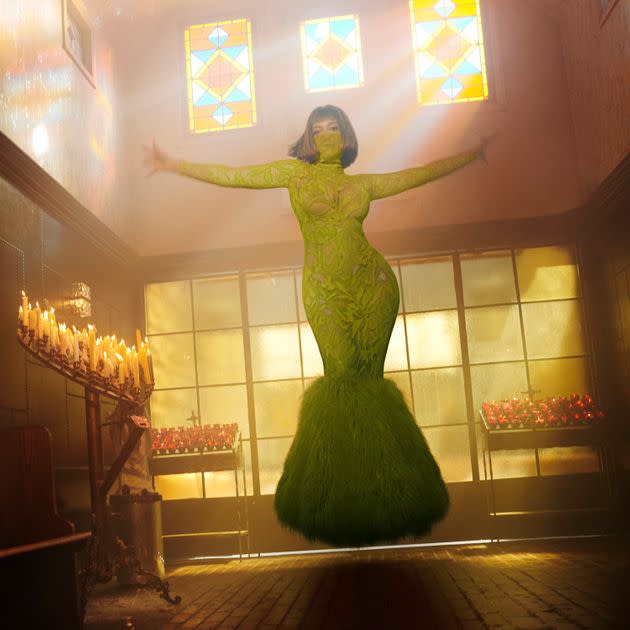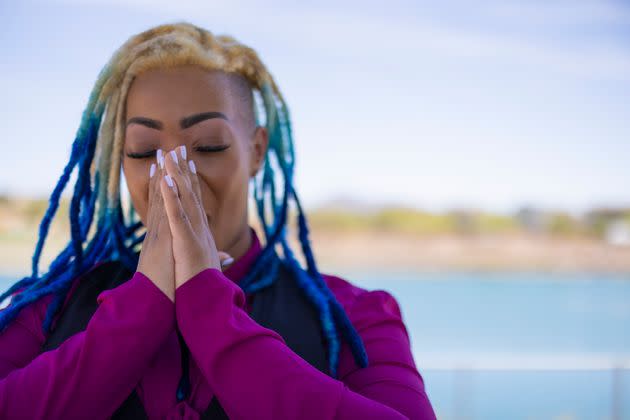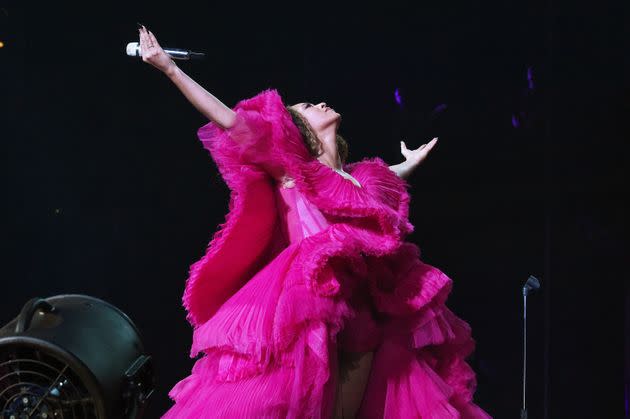Beyoncé's Church Girl Has Black Christian Women Going 'That's Me'

Beyoncé (Photo: PA)
Being called a ‘church girl’ isn’t something you want to brag about in the Black community. When you think of a church girl, you imagine an overly religious, rigid young woman who sings hymns and wears long skirts every day.
Not a picture you’d associate with Beyoncé (though hardcore Queen B fans will know her Christian roots from songs as old as ‘Gospel Medley’ on the Destiny’s Child album, Survivor).
In any case, it was an unexpected but very pleasant surprise to see a song about Christianity make an appearance on the track list for her seventh solo studio album, Renaissance.
We saw the title and all wanted to know what ‘Church Girl’ would sound like. “Soon as I get in this party, I’m gon’ let go of this body,” weren’t the lyrics I was expecting to hear, but they immediately ignited a feeling so familiar in me.
And not just in me. ‘Church Girl’ has quickly became a fan favourite, giving current and lapsed Black Christian women a true sense of recognition in song.
Me struggling to find a shirt that covers my stomach for church is what Church Girl is all about
— Bolu Babalola (pure) 🍯&🌶 (@BeeBabs) July 31, 2022
Church girl acting loose? Oh Beyoncé this song is me, 4sure
— The Great Negro (@jiggyjayy2) July 30, 2022
“As someone with a Christian background, there’s always that initial feeling of bewilderment when Church is associated with things we were indoctrinated to believe were unholy or un-Churchlike,” Adwoa Owusu-Barnieh, 24, tells me.
“So hearing Beyoncé, on a track called ‘Church Girl’, singing ‘drop it like a thotty’ was initially a bit odd. Once I’d got over that, the song is simply a bop.”
One line in particular resonated for Owusu-Barnieh, 24, an editorial assistant from London, “The lyric, ‘Nobody can judge me but me, I was born free’, is the most important lyric in that song for me,” she says.
‘Nobody can judge me but me, I was born free’
Owusu-Barnieh was raised in a Christian household, but as she got older she became aware of the parasitic relationship she had with certain aspects of Christianity and the people who practised it.
“I found the relationship I have with Christianity increasingly more difficult. I couldn’t claim it,” she tells HuffPost UK.
Owusu-Barnieh struggled to feel “free” when practising her faith, she says, despite finding some peace in the rituals of religion and bible study.
“When I formally decided (to myself) to separate myself from Christianity, it was because I felt betrayed by the religion. I couldn’t practise something that was causing me so much harm anymore,” she explains.
“Later on, I came to have a greater understanding of Christianity as the tool through which we were colonised, as a site of spiritual warfare, and (one of) the means by which Black people still find ourselves in mental slavery.”

(Photo: LPETTET via Getty Images)
The Black community’s relationship with the church is long and complex. During colonialism, Christianity was used widely and aggressively to promote and justify slavery. Scriptures such as “Slaves, obey your earthly master” (Ephesians 6:5), were used to reinforce the idea that slavery was right and normal.
A slave bible was even created by some slave masters, which excised specific parts of the bible to further promote slavery. Although Christianity was also used by some abolitionists to end slavery, they were part of a small minority.
African slaves practising traditional religions were forced to denounce their spirituality and practise Christianity instead. Fast forward to now, and many Black people across the globe still choose to follow the religion.
But it’s slowly losing its grip on parts of the community, with its stance on topics like homosexuality and abortion widely debated in church, leading many people, especially young people, to question the place Christianity has in their lives.
‘Bad girl actin’ naughty, church girl, don’t hurt nobody’
Like many Christian women, Paula Abu, a 23-year-old photographer, also from London, grew up believing that her body was supposed to be kept for the man she would eventually marry. But when was 14, she realised she was queer.
“Adding the concept of sex and having lustful feelings, I felt sinful and like I had to repress those feelings and it fostered an unhealthy environment mentally,” she tells HuffPost UK.
When Abu realised she was queer, she initially withdrew from the church because in her mind she thought the two things couldn’t mix. “I thought I had to pick one or the other but choosing to be away from the church didn’t sit well with me because my faith is very important to me and it always has been. So I didn’t feel liberated to leave the church. I felt quite lonely.”
Now that she’s older she understands her identity is multidimensional. “I’m a bisexual, tomboy-ish Christian woman,” she says. “I believe in God. My faith in God has never been stronger than it has in this precise moment.”
And when Abu heard ‘Church Girl’ for the first time she was so taken back she had to park her car to listen fully to the song. “For me it’s the lyric: ‘I was born free’,” she says, echoing Owusu-Barnieh’s standout moment in the song.
“There’s something so liberating about hearing those lyrics to that beat. Who robbed us of this freedom? Who told us that we weren’t free in Christ?”

Beyoncé performing in 2018. (Photo: Kevin Mazur via Getty Images)
Even in 2022, some churches, especially those with a large congregation of young people, are known to run events pushing the narrative of purity culture.
During my secondary school years in east London, I once attended a church which made girls as young as 13 promise to remain celibate until they were married, all in reward for a purity ring to seal the deal.
Though purity ceremonies like this aren’t as common in the UK as they are in the US, anyone who has gone to church from a young age will have heard the gospel of celibacy preached numerous times.
“There was always a huge emphasis on staying a virgin until you get married in church growing up,” says Ore Adedeji, a 26-year old HR advisor from Essex. “So I think I pretty much suppressed any notion of sexual desire in the name of staying ’pure and holy’.
“As I got older (early twenties) it dawned on me that it’s very easy to suppress your feelings when you have no one there to act out those desires with.”
And the constant reinforcement of the celibacy message can create so much guilt if or when you eventually decide to have sex.
“I was in a relationship and that whole situation was a never-ending cycle of guilt > shame > repeat,” Adedeji tells me. “Eventually the way I rationalised it to myself is: I love Jesus, and I am also a human who has sexual desires. That doesn’t make me evil and the two can coexist.”
’You know you got church in the morning, but you’re doin’ God’s work, you’re goin’ in’
Beyoncé just knows. Going “out out” on a Saturday night but waking up for church in the morning is a rite of passage for many Black Christian women. And the truth is, we do – and can – enjoy both.
“I used to feel super guilty if I’d been out on a Saturday, like too much of a hypocrite if I showed up at church the next day,“ Adedeji says. “But I actually enjoy church, so I push past that feeling now and go anyway.”
I wish 15-year old me could listen to ‘Church Girl’ now release myself from the pressures of moral perfectionism. My teen years up until the end of university were filled with guilt and repression. ‘Church Girl’ is a reminder that our relationship with God and religion is nuanced, and defined by our own story.
“There’s a certain level of oppression that Christians have used that affects Black female queer community and pushes them away from the faith,” says Abu. “And the album in its entirety to being dedicated to queerness and Blackness and womanhood in such a specific way spoke to my entire spirit,”
So let’s sing it again: ’Nobody can judge me but me, I was born to be free.”
I’m so happy I can finally feel it.
This article originally appeared on HuffPost UK and has been updated.

 Yahoo News
Yahoo News 